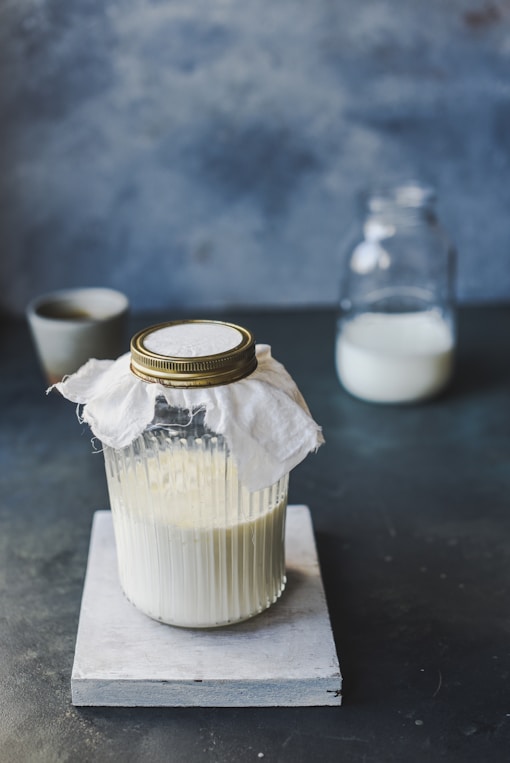Let’s be completely honest: supplements are sus. There’s a $152 billion industry built around the idea that the answer to all of life’s problems can be found in a bottle. Frankly, we’d love it if that was true, but anyone who has tried to lose weight for a while will tell you that there are no end of “magic” pills that are on offer which do very little.
But that’s not the whole story on supplements – there are a number of drinks, potions and pills which can all do their bit to help you get healthy. To kick off the new year we’ve reviewed seven supplements that actually work.
Kefir
After our research into kefir, the new saying should clearly be ‘a glass of kefir a day keeps the doctor away’. Who would have thought that such a simple (and tasty) snack can help lower blood pressure or reduce the risk for type II diabetes? Lately, many studies focused on kefir due to its rich probiotic content, showing that it can help increase the diversity of the beneficial bacteria in your gut microbiome and help with some aspects of irritable bowel syndrome.
Moreover, this study discovered that 30% of the lactose in milk is reduced in the kefir-making process due to fermentation and some bacteria in the final product help you digest lactose. So, kefir can be a good alternative to other milk products for those dealing with lactose intolerance.
Psyllium Husk
Psyllium or ispaghula is a natural bulk-forming laxative obtained from the husks of the seeds of Plantago ovata. Once it gets in your gut, it helps soak water and reduce constipation, which also means you will fart less. A study from 2000 that still stands showed that one component of psyllium escapes the fermentation in the colon and functions like a lubricant for the content, making it easier for you to push it through the pipes.
See also How Can Pain Impact Your Weight Loss?
Taking psyllium may also help lower cholesterol and stimulate insulin production, says a study from 2019, with great effects if combined with a fibre-rich healthy diet.
Melatonin
When you lose weight, your body tries to adjust to the new situation. Sometimes your guts need time to balance, and sometimes it is your brain that finds it difficult to shut down at the end of the day. Instead of taking sleeping pills for your insomnia episodes, go for melatonin. It is a hormone, and your body already produces it, but probably not in the right quantity. There’s excellent scientific evidence that this supplement can help you go to bed earlier and sleep more, and the best of it is that the effects don’t dissipate with continual use.
Fish Oil
When you look at the benefits of fish oil, it almost sounds like a magic pill. But there is a mound of studies behind this natural supplement obtained from the fat of mackerel, tuna, anchovies, and herring. Regular consumption of fish oil which is rich in Omega-3, can reduce blood pressure and lower cholesterol and triglycerides. It may also decrease chronic inflammation related to diabetes and heart diseases, and contrary to the expectations (since it is itself a fat) it may make your liver less fat. It can also help improve mental health and make depression symptoms easier to handle.
Vitamin D
During the summer, your body produces all the vitamin D you need under the direct influence of the sun. But then October ushers in 4 to 5 months of cloudy weather and it messes up your vitamin D levels. This then indirectly affects the amount of calcium and phosphate in your body. Contrary to what you have been taught, in the winter, you should supplement your vitamin D intake instead of vitamin C, which was actually proven useless.
See also Gift Ideas For Men Who Are Losing Weight
A lack of vitamin D can weaken your immune system and make you more vulnerable to colds. If the deficiency continues for a long time, it can also affect the density of your bones. Although some foods contain it, like red meat or egg yolks, taking a supplement may be more efficient.
Zinc
Zinc is a vital mineral, the second most abundant in your body after iron. Yet, your body doesn’t produce it, so you need to take it from food or supplements. By maintaining an optimal zinc level, you make sure your immune stands strong and is ready to kick back whenever a bug tries to get in. This study revealed that if you take 80–92 milligrams of zinc per day, you may shorten your cold’s duration by 33%. Zinc can also help heal wounds faster and has a good effect on acne treatments.
Green Tea
You may already be aware of the fat-burning effects of green tea, but did you know that it also helps you concentrate better and may help prevent type II diabetes? Some studies have focused on green tea’s ability to boost metabolic rates, but the results are still a bit… well, inconclusive. Yet, others have proved that the caffeine in this supplement can help you mobilise more energy and be more active while at the gym. Moreover, this rigorous study performed on Japanese subjects showed that caffeine decreases blood sugar and helps maintain a healthy insulin level.
Conclusion
Although there are plenty of miracle pills out there, some incredibly expensive, usually those that do work are simple and cheap. Make sure your doctor is happy with you taking these supplements and if so then you can experiment on yourself to find which of these supplements help to get you healthy in 2023.





